The slippery slope of self-medication
Pop a painkiller and get to work—That’s the busy millennial life. An annual medical check-up or that ultrasound to figure out just what’s causing the recurrent what-feels-like heartburn can wait. Meetings, presentations, and paperwork at the office take precedence over our health because, really, who doesn’t have niggling pains and aches every once in a while?
It’s this mindset that has most people self-medicating themselves. Pharmacists around the valley confessed that on a daily basis they have more people coming to buy medicines without a doctor’s prescription than with one. And they aren’t just buying paracetamol or anti-diarrheal pills. More often than not, it’s antibiotics, blood pressure medications, and even psychiatric drugs.
Pharmacist Krishna Dhakal, who has been running Narayani Pharmacy in Thapathali, Kathmandu, for 22 years, says it’s the easy accessibility to drugs that has people becoming their own doctors. A quick Google search of your symptoms and a trip to the nearest pharmacy is most people’s two-step treatment plan.
“This approach is sure to backfire sooner or later. You are doing your health a great disservice if stopping by a pharmacy and buying random medicines is a regular thing,” says Dhakal, adding many people also tend to look at their friends’ cases as reference for self-diagnosis. If so and so medicine cured a friend’s sore throat then it will surely work for them too, they think.
“But each case is unique or there might be an underlying cause of your problem that could get worse without the right treatment,” he says.
According to Nim Raj Tamang, assistant pharmacist at Nirvan Pharmacy in Pulchowk, Lalitpur, earlier it was mostly people from low-income groups who used to visit pharmacies with their health woes. They were trying to save on doctor’s consultation fees. That money, they felt, could be used to buy a month’s supply of medicines. But as the internet became more pervasive, everyone slowly became experts in treating themselves.
Zero faith in healthcare
During the Covid-19 pandemic, Tamang says, many people hoarded antibiotics and took them for a day or two at the slightest hint of a runny nose or cough. This happened and continues to happen because of two reasons, he believes: First, people aren’t aware of antibiotics resistance and what overusing them can lead to and second, most people have a couldn’t-care-less approach to health as long as they aren’t ill or in pain as there is always more important work to be done.
But self-medication isn’t a trend only because it’s convenient. Talking to random people out and about their day—catching up with friends at a coffee shop in Battisputali, shopping at a grocery store in Sanepa, and having masala tea at Pulchowk in the evening—ApEx found that majority of people seem to have no faith in the country’s healthcare system, which is curative rather than preventive.
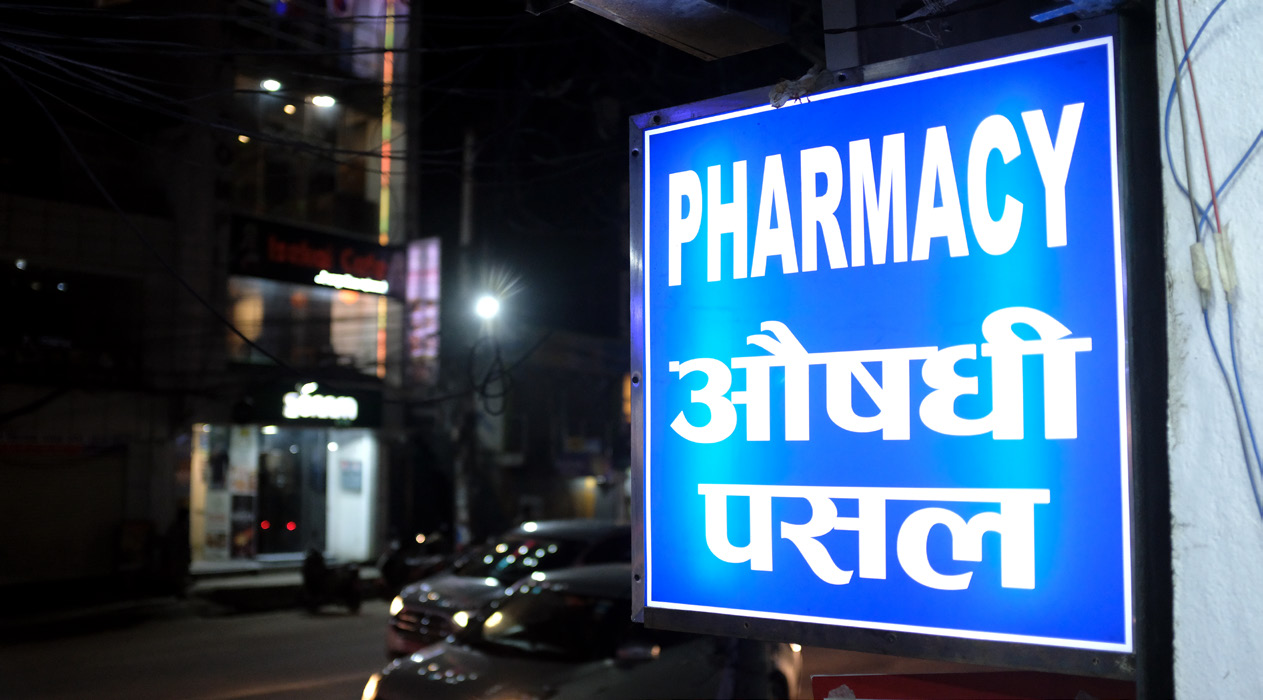
Doctors, they said, don’t give you more than two minutes or listen to your queries properly unless your condition is serious. The unanimous opinion was that there was no point in annual health checkups or consulting doctors unless you thought there was something seriously wrong with you.
Sarah Shrestha, 32, a public relations officer, says her company pays for an annual full checkup but she, in the past two years, hasn’t been to a hospital. Shrestha says she doesn’t want to spend an entire day at a hospital getting tests after tests done and then another day waiting for the doctor to look at her reports and certify she’s in good health and prescribe vitamins.
“I would know if I was sick, wouldn’t I? So, if doctors aren’t going to tell me how I can stay healthy or counsel me about what I should or shouldn’t do in the future, then I will only schedule an appointment when I’m actually unwell,” she says.
Roshan K.C, 24, who is taking a gap year before going to India for his masters later this year, says a pharmacy visit will suffice for minor ailments because there is nothing a pharmacist won’t tell you that a doctor will.
“Of course, doctors have more knowledge but in Nepal they don’t have the time or the willingness to share that information,” he says.
It seems Nepalis are definitely more inclined than ever to rely on over-the-counter drugs unless they perceive themselves to be in life-threatening situations. Of the 25 people questioned, 24 said hospitals in Nepal were only for emergencies and surgical procedures.
Lasting damages
However, the impact of self-medication is far-reaching. Immediate serious side-effects aside, misuse of drugs can give rise to long-term health problems that are difficult to cure because your body doesn’t respond to treatments. Improper dosage of antibiotics or failure to complete its course could lead to your body becoming resistant to it. You will thus require stronger medicines in the future. Its overuse, on the other hand, could destroy your body’s natural flora making you prone to various infections and diseases.
“Little knowledge is a dangerous thing. As clichéd as that might be, it couldn’t be truer,” says Suman Dawadi, a pharmacist at Sesaang Pharmacy in Thapathali, Kathmandu. He says a lot of times people come to the pharmacy asking for a tablet or two of antibiotics.
“I think in such cases the onus lies on the pharmacists too. We should not sell the medicines, or we should make people aware about the proper dosage and the importance of sticking to the recommended course even when their symptoms go away,” says Dawadi.
The problem is, he says, that is not what happens and one or two pharmacies developing a conscience isn’t going to change much. There isn’t a strict drug regulation and monitoring system in Nepal. Most medicines that shouldn’t be sold over the counter are being bought recklessly without prescriptions.
The Department of Drug Administration under the Ministry of Health and Population has classified drugs into different categories—a, b, and c—with statutory warnings printed in bold red on packages of drugs that shouldn’t be sold without a prescription.
Category ‘a’ consists of narcotic and poisonous drugs. Antibiotics, hormones etc. fall under category ‘b’. These are prescription drugs and can only be sold by a pharmacist or a medical professional. The drugs that fall under category ‘c’ are the only ones that can be sold over the counter, without a prescription.
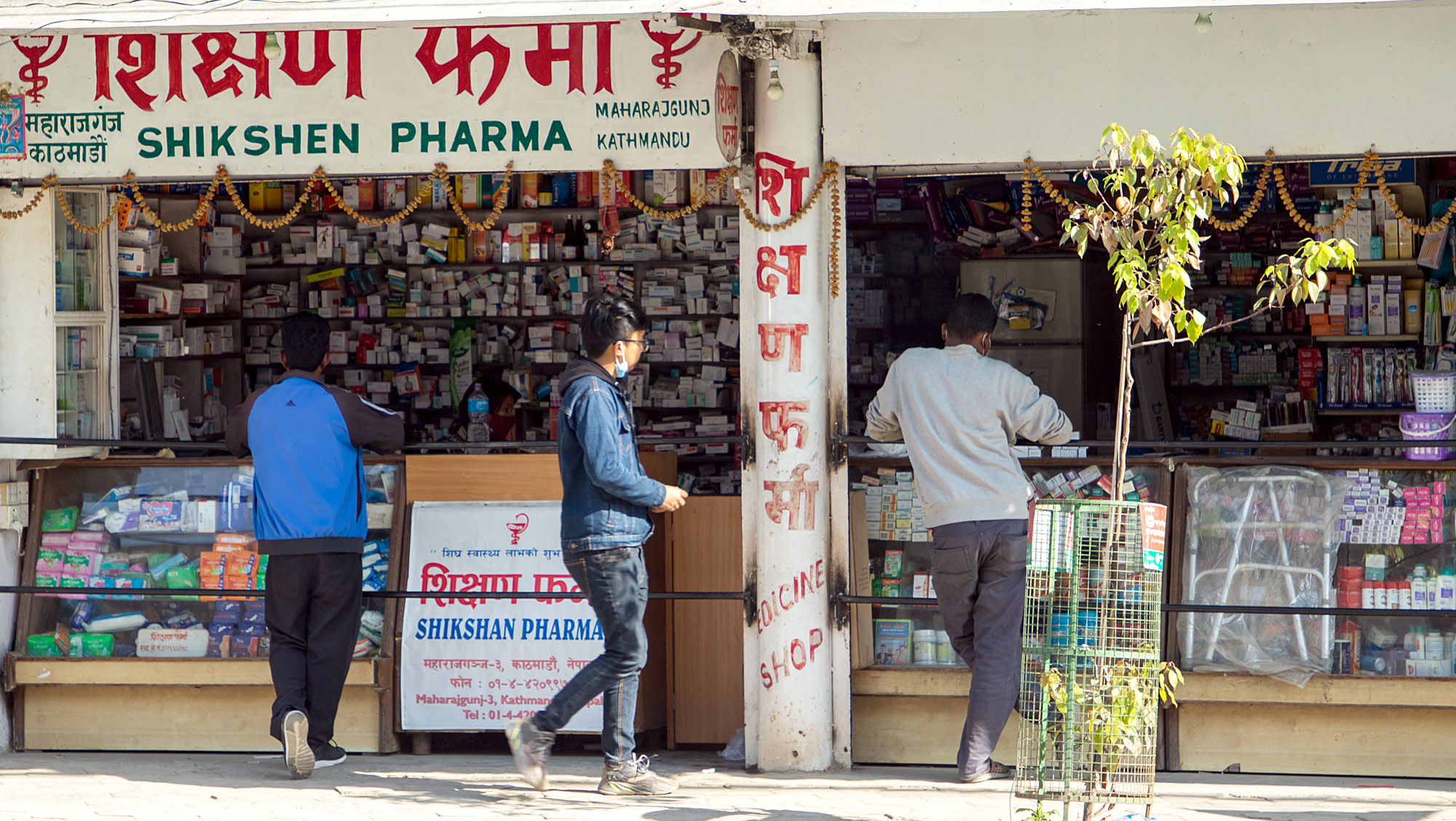
“Unfortunately, in Nepal, everything is being sold over the counter,” says Dhakal. He says it’s not unusual for people to come with old prescriptions for fresh complaints, claiming the medicine worked in the past and so they will just continue with it. Topping up prescription drugs without going for a follow-up is also quite common. What the doctor intended for you to have for six months, say for high blood pressure, you’ve probably had for a year or more.
“With stricter rules to ensure prescription drugs couldn’t be sold over the counter, people would have to go to see a doctor when they are unwell,” says Sanjit Chaudhary, pharmacist at Alka Hospital Pharmacy in Jawalakhel, Lalitpur.
That alone, however, won’t be effective in curbing the problem, argues his colleague, pharmacist Sajan Chaulagain. The issue here, he points out, is that there are just too many community pharmacies that are often run by people with zero pharmaceutical knowledge. As pharmacies have become business- and not service-oriented, even if a certain pharmacy does not sell prescription drugs without a doctor’s slip, there are bound to be at least ten others that will.
“People need to be cautious where their health is concerned. It’s not something to be taken lightly. We can’t always depend on rules, laws, penalties or on the government,” says Chaulagain.
The way out
Dr Namita Sindan, gynecologist at Paropakar Maternity and Womens’ Hospital in Thapathali, Kathmandu, agrees and says she is appalled by people’s ignorance and carelessness in health matters.
Stringent drug regulation laws wouldn’t hurt but a lot more needs to be done to tackle the problem, says Dr Sindan. There needs to be greater awareness about the long-term repercussions of being negligent with your health. Medical professionals—doctors, nurses, pharmacists—must also strongly dissuade people from self-medicating.
“There was recently a maternal death because the woman had taken random painkillers to manage discomfort. Her child died in the womb and that led to a fatal infection,” she says adding there are also many preventable deaths in the country because women take abortifacient drugs to terminate unwanted pregnancies without medical advice.
There are many contraindications for drug use, especially in case of antibiotics and other prescription medicines. A medical personnel can determine which drug will work in which case and when a certain medicine shouldn’t be administered. This knowledge comes from training and practice. An internet search or even pharmacists can’t give this information to you.
A general consensus among medical experts seemed to be that people could explore telemedicine that enable them to get health-related services and information through video-conferencing apps and tools. Something is better than nothing is the principle that could be applied here, says Dawadi, adding when even simple over-the-counter medications can have rare but severe adverse reactions, it’s best to err on the side of caution.
“There is no substitute for expert advice. A consultation or checkup instead of popping random medicines could save you from many unnecessary health troubles, if not potentially save your life,” concludes Dr Sindan.
Area of Fewa Tal: Dozen studies, dozen findings
Chief Minister of Gandaki Province Prithvi Subba Gurung on February 28 made public a demarcation report of Fewa Tal. The provincial government, under the coordination of the then District Development Committee Chairman Punya Prasad Poudel, had finalized the report on the famous lake, a major tourist attraction of the region.
Making the report of the ‘Fewa Tal Demarcation and Mapping Committee’ public, minister Subba informed that the area of Fewa Tal is 5.726 sq. km, which is lesser than the area demarcated by a 1982 joint study of the Government of Nepal and the United Nations Development Program (UNDP), which capped the area of Fewa Tal at 5.80 sq. km.
Punya Poudel, coordinator of the committee, informed the press that the new report is the most scientific. According to a report prepared by the British Survey of India in 1925-1926, the area of Fewa Tal was 3.46 sq. km. Then, in a report prepared by the Survey of India in 1957-1958, the area changed to 4.39 sq. km.
Among all the surveys conducted to measure the area of the Fewa Lake, the report of the Nepal-India Cooperation Mission from 1971-1972 shows the Fewa as expanding over a whopping 10.35 sq. km. But based on available scientific facts and maps, the members of the current study team concluded that never in the history was Fewa Tal so big.
Khim Lal Gautam, member secretary of the committee and chief survey officer of the Survey Office, Kaski, informs that the lake area was calculated based on previous studies, scientific facts and evidences. The committee also analyzed the height of the Fewa Dam and the area covered by water during the rainy season. The demarcation report has been prepared on the basis of physical (electrical resistivity tomography) study.
Area of Fewa Tal in a dozen study reports
1: British Survey of India (1925-1926): 3.46 sq. km.
2: Survey of India (1957-1958): 4.39 sq. km.
3: Report of Nepal-India Cooperation Mission (2018): 10.35 sq. km.
4: First Fort Napi, Lot No. 297 (1976-1977): 4.43 sq. km.
5: Government of Nepal and United Nations Development Program (UNDP) Study Report (1982/1983): 5.80 sq. km
6: IUCN Study Report (1995): 4.49 sq. km.
7: District Development Committee Kaski B.Sc. (2005): 4.25 sq. km.
8: Pokhara Valley Urban Development Committee (2008): 5.06 sq. km.
9: Vishwaprakash Lamichhane’s Report (2013): 6.5 sq. km.
10: Ministry of Land Reforms (2015): 5.07 sq. km.
11: Pokhara Municipal Corporation (2021): 5.08 sq. km.
12: Committee formed to demarcate Fewa Tal (2021): 5.726 sq. km.
Should Nepal’s elderly take the Covid-19 vaccine? Absolutely, say experts
The Ministry of Health and Population is all set to begin the second phase of immunization against Covid-19 from 7 March 2021. Those above 55 are the priority this time. But most people belonging to this group seem hesitant. They aren’t sure if the vaccine is safe.
This concern stems largely from what they have seen on social media. Many people who got the vaccine, worldwide, have complained of headaches, fever, and fatigue among other side-effects. Also, the fact that the first phase of the vaccination in Nepal saw a moderate turnout, with only half of the prioritized individuals inoculating themselves, has people questioning its safety, efficacy and need.
Tara Shrestha, 66, housewife and resident of Pulchowk, Lalitpur, says her eldest daughter who’s in London, UK, suffered from fatigue and fever after getting the vaccine. Shrestha wasn’t enthused about getting vaccinated in the first place and now she has made up her mind: She isn’t going to.
“There’s no point of it if it’s going to make me ill. At least I’m okay right now and there’s no imminent danger,” she says.
Safety concerns
The effects of the pandemic-induced infodemic—wherein everybody became an expert and made their ideas public via social media leading to information inundation—has perhaps never been as evident as today, fueling a sense of unease and skepticism. People don’t know what to believe in but the worst of it doesn’t leave their minds.
‘What if the vaccine doesn’t work and makes me sick with Covid-19 instead?’, ‘What if I am allergic to the vaccine?’, ‘Will I have to keep getting new shots every time the virus mutates?’ and, ‘Do we actually need a vaccine as Covid-19 infections are already on the decline?’—These were some of the common concerns among a random sample of 37 people ApEx spoke to on the streets of Lalitpur and Kathmandu.
Saraswati Karki, 47, who runs a grocery store in Gaushala, Kathmandu, isn’t going to let her parents and in-laws, all of whom are over 60, get inoculated. She sees no need for it as she believes the threat has largely passed. She says home remedies like turmeric water and ginger fenugreek paste have protected her family so far. They will continue consuming different herbal concoctions like these to stay safe.
“I wouldn’t have been so opposed to my family getting vaccinated if I was sure it was safe. Everybody I know who has gotten the vaccine has complained of one or the other side-effect,” she says.
Queries answered
However, Sameer Mani Dixit, PhD, a public health expert, says everyone, except those who are severely immunocompromised, should get the vaccine.
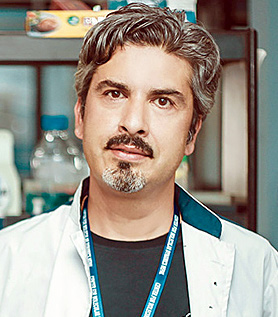
No one should be in two minds about it, he says. The Covid-19 vaccine is not at all harmful and poses no threats whatsoever to the human body. What’s important to understand, he says, is that every vaccine will have some side effects and that’s completely normal.
“The idea that you can get Covid-19 from the vaccine is baseless,” says Dixit. What’s true instead, he adds, is that millions of elderly people around the world have been vaccinated against Covid-19 and no one has died or even been gravely ill.
“As far as I know, even fever isn’t a common side effect of the vaccine among the elderly,” he says. This, he explains, is because as you age your immune response becomes low and doesn’t kick in as effectively as it would have when you were younger.
Various reports suggest that mild body ache, chills, and other flu-like symptoms are common and go away in a couple of days. The side effects are a small price to pay for the potential risks you run if you choose not to get jabbed.
Dr Shailendra Kushwaha, consultant cardiologist at Norvic International Hospital, Thapathali, Kathmandu, says the WHO guidelines for the Covid-19 vaccine clearly state that everyone except those under 18 and those suffering from acute phase of fever, cough or other diseases requiring hospitalization are eligible for the vaccine.
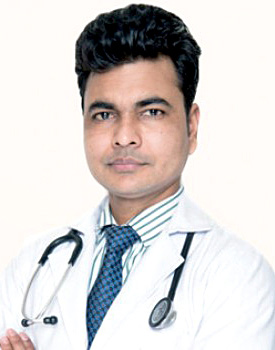
Vaccine contraindications
Dr Kushwaha says there are a lot of false beliefs emanating from lack of information dissemination and the resultant unawareness.
And indeed, unavailability of information regarding the vaccine—its importance and contraindications—was cited as a major reason most people didn’t want to get vaccinated. Even those who thought they would eventually have to get it wanted to wait and watch for a while, see how others would react to it.
According to Dr Kushwaha, the vaccine is contraindicated for those who have previously had allergic reactions to vaccines or injectable therapies and other pharmaceutical products. It’s also not recommended for pregnant women and lactating mothers as these groups haven’t been part of any Covid-19 clinical trials so far.
The vaccine is also temporarily not advised for those who have active symptoms of SARS-CoV-2 infection or those who have been given anti-SARS-CoV-2 monoclonal antibodies or convalescent plasma as well as those who are currently unwell and hospitalized.
“For those who have a history of bleeding or coagulation disorder, it’s best they get the vaccine under their physician’s supervision,” says Dr Kushwaha, adding that this is currently what we know for sure about the vaccine based on clinical trials.
“It’s all very new and much of it is being studied. We still don’t know many things about the vaccine and new information will become available as we move forward. But that doesn’t mean we have to be scared of getting vaccinated,” he says.
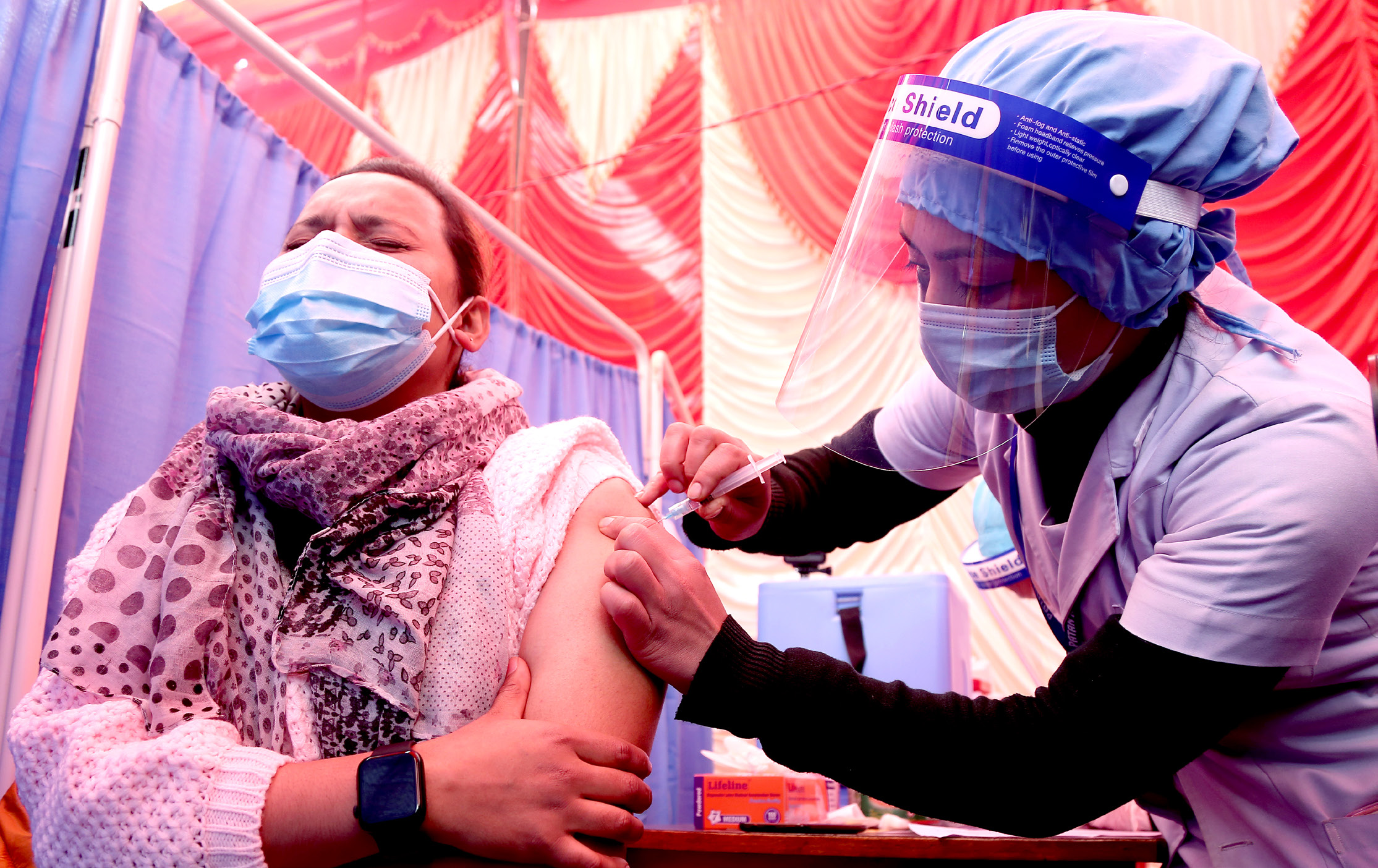
Both the experts—Dixit and Dr Kushwaha—also stress on the importance of the vaccine for those who have already contracted Covid-19. Dixit says if you have recovered from Covid-19, there’s no reason why you shouldn’t get vaccinated to give your immune system the boost it needs to fight future infections.
Informed decisions
What’s unfortunate is that the Nepal government hasn’t been able to effectively convey just how vital it is that everybody takes the vaccine. Out of the 37 people we talked to, 34 confessed they thought the vaccine was unsafe. They felt the government must have procured low-quality vaccines or made some compromises for commissions.
Sunny Vaidya, 26, who works at Dhukuti, a retail outlet for the Association of Craft Producers, in Kupondole, Lalitpur, says it’s the general sense of mistrust that leads to fear—more so now when our health is at stake.
“Our government is a sham. Everything it does benefits the ones in power and puts the rest at a disadvantage. It’s hard to believe they have the public’s interest in mind while urging us to get vaccinated,” he says.
Vaccines work by mimicking an infectious agent—viruses, bacteria or other microorganisms—that can cause a disease. It trains and prepares our immune system to effectively and quickly respond against it, thus preventing its multiplication that leads to diseases. Getting the Covid-19 vaccine readies your body to fight the virus should you get infected.
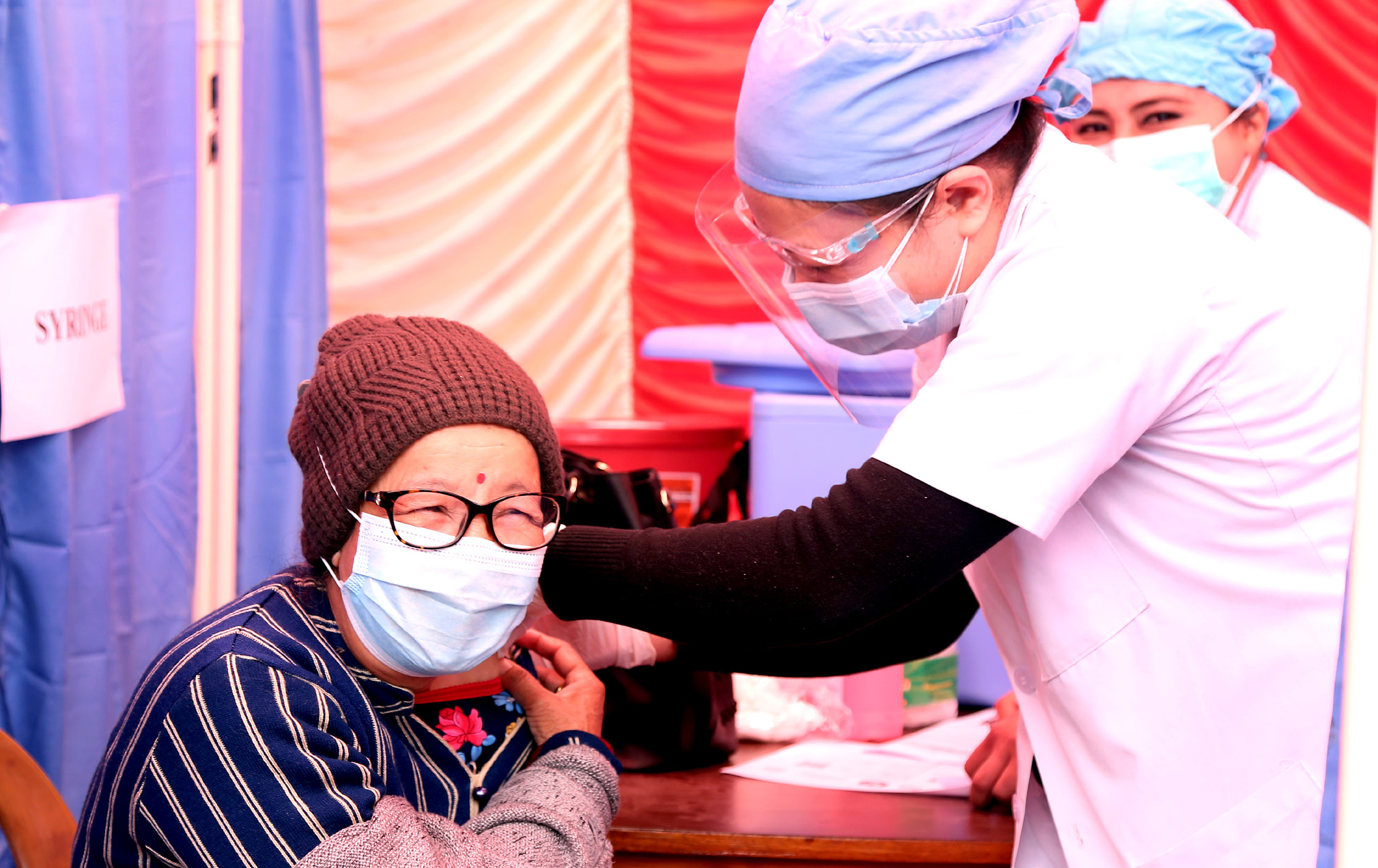
According to Dixit, many people also seem to think that being vaccinated means they will not be infected by the virus, which is not true. What happens is that their bodies will fight the virus and not let it multiply, thus effectively killing it, because their bodies have been prepped to recognize it as a threat.
“You might get infected with the virus after you take the vaccine but you won’t suffer from the diseases it could cause,” says Dixit. And given all the potential complications of the novel coronavirus, getting the shot seems to be the safest bet.
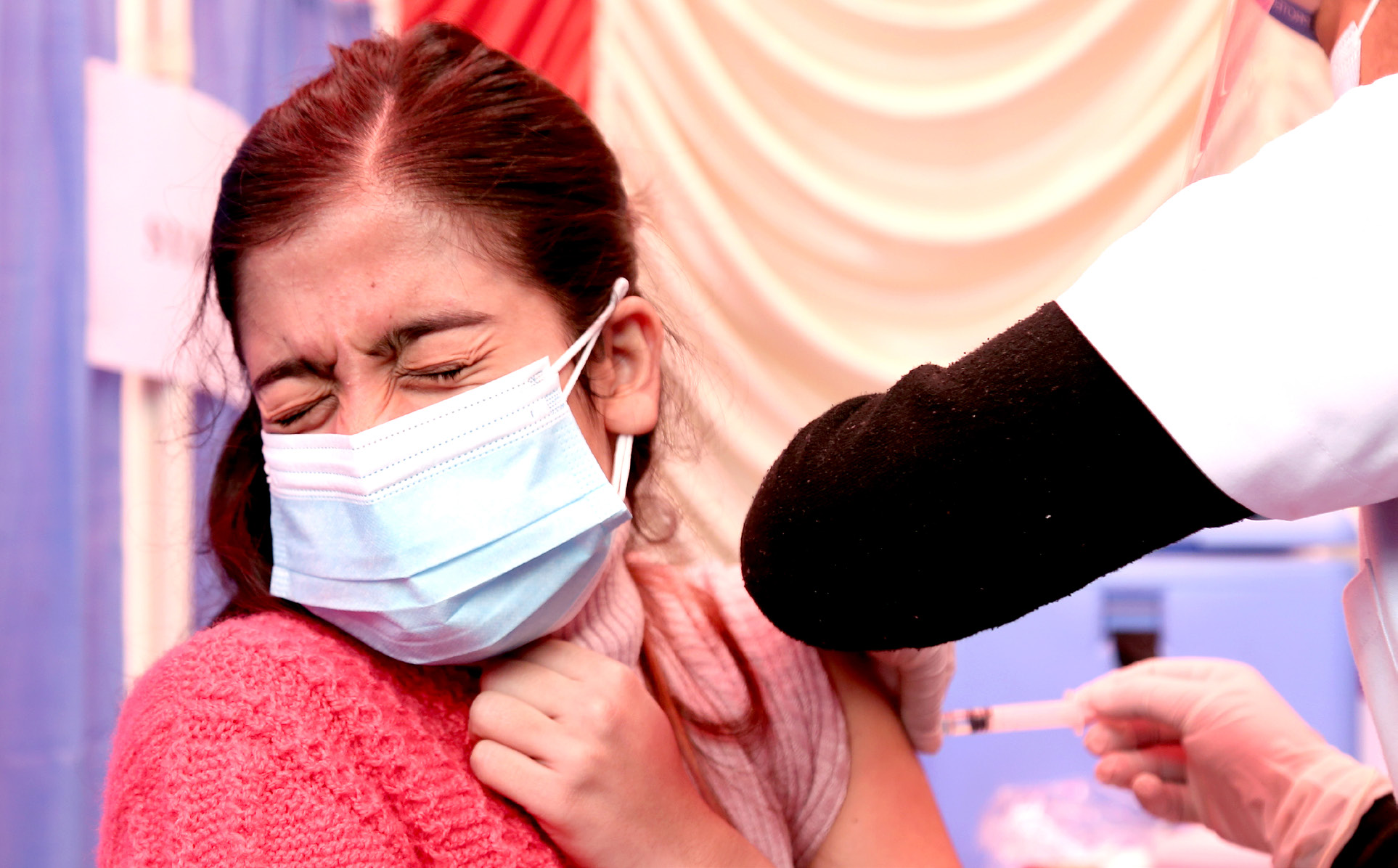
Province 1 traffic police enforce ‘no-horn’ rule with love
Assistant Inspector of Police (ASI) Tulamani Acharya stops a bus plying on the Koshi Highway at Dhat, Biratnagar and greets the driver with a Namaste. The driver, used to being shouted at by traffic police officers, is surprised. Acharya then requests the driver to desist from using pressure horns from now. The driver reciprocates the greeting, acknowledges the request, and drives off.
Likewise, ASI Kishor Niraula stops a honking truck at Virat Chowk of Morang on the East-West Highway. Niraula also greets the scared-looking driver with a Namaste and makes the same request. Niraula was informing all the drivers of vehicles on the road-section in the same way.
ASI Dhamendra Rajbanshi was similarly informing drivers on the Biratnagar-Rangeli road section at Karsia in Morang of the rule that bars the use horns except during emergencies. Putting his hands together, Rajbanshi also politely warns that in the future, strict action will be taken against those who break the rules. The drivers in turn commit not to honk.
Traffic police personnel deployed across all 92 units of Province 1 are busy on the roads, spreading awareness against honking, with their stern but gentle warnings.
Previously punished with fines and reproach, the drivers are surprised at this gentler approach of the traffic police. Pankaj Sah, a driver, says he is impressed. “We were scared every time a traffic cop stopped us. We feared we had unknowingly violated some rule and would now be slapped with heavy fines,” Sah says. “But now they’re stopping us only to give us warning. This is good. Everyone has to abide by the rules.” Sah finds the traffic police’s changed behavior and new approach persuasive.
As noise pollution has increased in the region, the traffic police recently launched a special campaign aimed at making the province a completely horn-free zone.
Chandra Bahadur Khadka, Chief Inspector of Morang Traffic Police, also urges drivers to stay within the limits set by traffic rules. The traffic police are using placards and one-minute stops to raise awareness. Non-compliance to rules will result in disciplinary action, Khadka informs.
Province Traffic Police Chief SP Sanjeev Sharma informs that the special campaign to control noise pollution will ban the use of pressure horns in all 14 districts of the province.
Horning was already banned in the province but the ban was not informed during the lockdown as there were hardly any vehicle out on the street at the time. But now the province is in a mood to strictly enforce the ban.
According to the Vehicle and Transport Management Act, a driver violating the ‘no horn’ rule can be fined between Rs 500 and Rs 1,500. SP Sharma informs that the rule will be deemed to have been violated if the driver honks under the pretext of overtaking, signaling, asking for lane change, and crossing intersections.



















